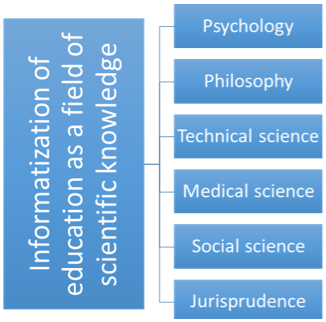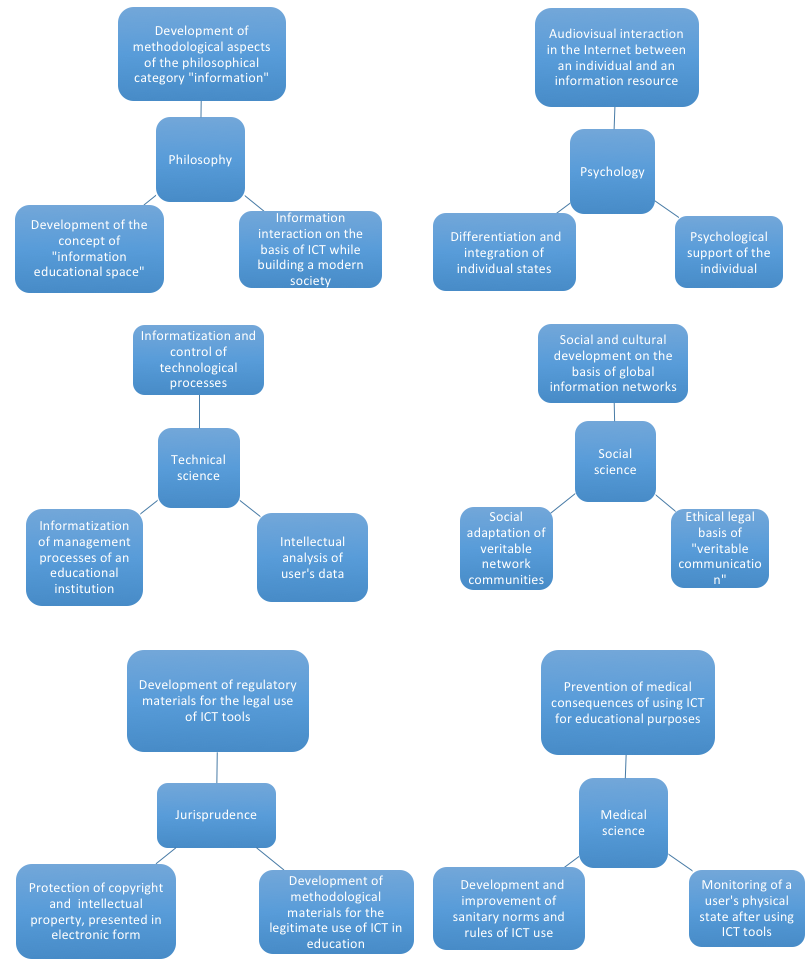

 Vol. 39 (# 20) Year 2018. Page 6
Vol. 39 (# 20) Year 2018. Page 6
Natalia V. GOROKHOVA 1
Received: 20/03/2018 • Approved: 18/04/2018
3. Informatization of education as a process and area of pedagogical science
4. Informatization of education as an integrative field of scientific and pedagogical knowledge
ABSTRACT: Basic approaches concerning the problems of informatization of the educational sphere in the information environment are considered. New information and communication technologies (ICT) are shown as an electronic tool of pedagogical science. The tranfer zones of information media of the educational process are formulated. Education is proposed to be viewed as a social and cultural phenomenon that uses the foundations of information and communication technologies and forms an informational culture and society. |
RESUMEN: Se consideran enfoques básicos sobre los problemas de informatización de la esfera educativa en el entorno de la información. Las nuevas tecnologías de la información y la comunicación (TIC) se muestran como una herramienta electrónica de la ciencia pedagógica. Se formulan las zonas de transferencia de los medios de información del proceso educativo. Se propone que la educación sea vista como un fenómeno social y cultural que utiliza los cimientos de las tecnologías de la información y la comunicación y forma una cultura y sociedad informacional. |
The development of information and communication technologies (ICT) leads to a significant transformation of the information environment of modern society, opening up new opportunities for social progress, which is reflected in the field of education. Many modern studies are devoted to identify special characteristics of pedagogical science using the means of information and communication technologies (Vagramenko and Yalamov, 2015, p. 15). In some modern researches and surveys, the problems of improving education with the use of information and communication tools are examined, the conditions for changing the paradigm of the educational process, both in the direction of its democratization and the modification of the learning interaction between participants in the learning process, as well as the development of didactic principles of teaching are also discussed (Putin, 2005, p. 18; Alashkevich; Zainutdinova, 1995, p. 23).
Training on the basis of information and communication technologies is organized as a process of educational and informational interaction while providing telecommunication access to an information resource and to information technology services for educational purposes (Kirko et al., 2014, p. 44) (Fig. 1):
- search, processing, exchange and use of scientific, pedagogical, educational, methodical, technological, technical materials presented in electronic form, used in comfortable and health-saving conditions (Robert, 2010, p. 132-137);
- informational interaction is realized between the student (learner), the interactive source of educational (professional) information (interactive learning tool) and the teacher, so training becomes interactive, functioning on the basis of ICT (Kozlov, 2005, p. 57).
Figure 1
Education model

Special attention is to be paid to the didactic power of ICT which creates prerequisites for intensifying the processes of education:
✓ immediate feedback between the user and ICT tools;
✓ computer visualization of information (phenomena of real and virtual) (Kirko et al., 2014, p. 23-33; Gorokhova, 2011);
✓ interactivity;
✓ usage of different types of information and the ease of its transfering;
✓ simple access to information resources, including the global Internet;
✓ automation of all processes of computing information;
✓ possibility of demonstration and laboratory experiments (Vagramenko et al., 1992);
✓ information and methodical support (Baskakov and Tulenkov, 2004, p. 91-96; Feyerabend, 1986, p. 87-94);
✓ organizational management of educational activities and control of learning outcomes (Zhurakhovskiy and Shamshurin, 2006, p. 41-43).
In many scientific reviews, the implementation of ICT opportunities in the educational process is carried out by pedagogical science as an area of pedagogical knowledge, which is oriented to provide the educational sector with methodology, technology and practice of the main areas of scientific research: philosophical, methodological, pedagogical, social, psychological, medical, legislative, technical and others (Afonin and Vagramenko, 2017, p. 25-36). To satisfy the needs of modern society of mass communication and globalization the basic directions of educational process has to be developed:
- new ways of education appropriate to the development of the trainee’s personality and its socialization to the modern conditions of the information society of mass communication and globalization (including forms, methods and means of teaching);
- innovative models and existing pedagogical technologies for the use of ICT tools (Lavina, 2006, p. 105-109);
- methodical training systems focused on the development of the intellectual potential and the formation of skills to acquire knowledge independently (collect, process, transfer, store and produce information);
- electronic educational ICT resource (on the basis of demonstration prototypes) (Martirosyan, 2004, p. 12-15);
- software tools and systems for educational process automation;
- pedagogical applications in networks based on an information resource of open educational telecommunication;
- creation and use of automatic tools for psychological and pedagogical testing, methods of monitoring the level of knowledge of trainees, their progress, their intellectual potential (Kirko et al., 2014, p. 23-33; Zhurakhovskiy and Shamshurin, 2006, p. 72);
- legal system for managing the educational process by using automated databases and databases of scientific and educational informational and methodological materials (The concept of modernization…).
Informatization of education is regarded as an area of pedagogical science, which includes the subsystems of education and combination of psychological, pedagogical, social, physiological, technical, scientific and practical researches, which creates a certain type of integrity, providing the educational sector with the methodology, theory and practice to perfect and optimize the use of ICT tools in comfortable and health-saving conditions (Robert, 2010, p. 67).
Analyzing the main directions of the informatization of education (paragraph 1), it is possible to note that the development of each of them requires a number of scientific and practical areas of traditional sciences. Traditional sciences, on the one hand, introduce a completely new field of scientific knowledge, which is initiated by the process of informatization of education, and which begins to exist independently in this traditional science «working» to develop the education. On the other hand, the new field of scientific knowledge that has arisen in the traditional science continues to evaluate, thanks to the development of the informatization, forming a new branch of pedagogical knowledge – the informatization of education (Robert, 2010, p. 5-9).
According to the studies of using ICT tools in the field of education, the informatization of education is reviewed as a transfer-integrative field of scientific knowledge because it provides:
Thus, transfer zone is innovative field of scientific knowledge which was arosen in a certain traditional science as a result of the development of the informatization of education. Significant feature of transfer zones, which originated in traditional scientific fields (sciences) in the form of scientific and practical zones, is their possibility to be attributed to a certain traditional science, where they help to solve problems and to develop simultaneously the new fields of the informatization of education (Robert, 2010, p. 9).
The transfer-integrative field of scientific knowledge of informatization of education and transfer zones, which originated in traditional scientific fields in the form of scientific and practical zones can be presented as follows (Fig. 2):
Figure 2
The transfer-integrative field of scientific knowledge
of informatization of education and transfer zones

The development of fundamental scientific researches in the field of the informatization of education can be represented in the form of a spiraling process that is determined by the evolution of transfer zones and is implemented in accordance with the following «scenario» (Kulikov, 2005, p. 103) (Fig. 3):
a) identification of the content of each transfer zone;
b) identification of scientific and practical results obtained by the corresponding traditional science in each of the transfer zones;
c) integration of scientific and practical results obtained by the corresponding traditional science as a solution of the informatization of education;
Figure 3
Trasfer zones of ICT

d) forecasting of the development of the informatization of education in the context of scientific and practical results in all transfer zones in the scientific field of computerization education (Mukhametzyanov, 2010, p. 10; Kosenko, 2008, p. 87-8).
Thus, on the basis of the analysis of the main fundamental researches in the field of the informatization of education and the identification of the directions of integration processes that united in a single scientific and practical zones and were formed in a certain traditional science it is possible to carry out the forecast of scientific and practical zones development using information and communication technologies in the field of education. It will expand the theoretical potential of domestic and foreign researches in the field of realizing the potential of information and communication technologies for educational purposes.
Afonin, A.N., Vagramenko, Y.A. (2017). Creative interaction of students in the informational and educational environment in college. Pedagogical Informatics, 2, p. 25-36
Alashkevich, M. Ministry of Education and Science of the Russian Federation in the field of computerization of education. The World Banks “Russia E-Learning Support Project, vol. 1 of 1”.
Baskakov, A.Y., Tulenkov, N.V. (2004). Methodology of scientific research: Tutorial. Kiev: Nauka.
Feyerabend, P. (1986). Selected works on the methodology of science. Translation from English and the German by A.L. Nikiforov. Moscow: Progress.
Gorokhova, N.V. (2011). Computer training in the English pipeline terminology is an important task of computer linguistics. High technologies, fundamental research, economics. Volume 3, Part 1: Collection of articles of the International Scientific and Practical Conference “Fundamental and applied research, development and application of high technologies in industries”. St. Petersburg: Publishing house of Polytechnic University.
Hasanov, E.L. (2016). About Comparative Research of Poems “Treasury of Mysteries” and “Iskandername” on the Basis of Manuscript Sources as the Multiculturalism Samples. International Journal of Environmental and Science Education, 11(16): 9136-9143.
https://uchebniki-besplatno.com/ekonomicheskih-ucheniy-istoriya/informatizatsiya-obrazovaniya-33303.html (accessed November 19, 2017).
Kirko, V.I., Pack, N.I., Malakhova, E.V. (2014). Education For The Future: New Strategies of Distance Education of Universities of Eastern Siberia. The Turkish Online Journal of Distance Education - TOJDE, 15 (4), 23-33.
Kosenko, I.I. (2008). Study of the Internet as a means of social communication. Informatics and education. Moscow, 9, 87-89.
Kozlov, O.A. (2005). Infrastructure of the personnel training and the informatization of education: the state and prospects. Reports of the VI International Conference of Universities Teachers, Scientists and Specialists “High Technologies in the Pedagogical Process”. Nizhny Novgorod: VGIPA.
Kulikov, S.B. (2005). Fundamentals of the philosophical analysis of science: methodology, meaning and purpose. Tomsk:TIU.
Lavina, T.A. (2006). The substantive and organizational aspects of teachers training (ICT tools in professional work). Informatics and education, 7, 105-109.
Martirosyan, L.P. (2004). Information Technologies in Teaching Mathematics. Informatics and Education, 6, 12-15.
Mukhametzyanov, I.S. (2010). Medical aspects of informatization Education. Moscow: IIO RAO.
Putin, V.V. (2005). Speech at the meeting of the Government, leaders of the Federal Assembly and members of the Presidium of the State Council, 5th September. Retrieved from:
Retrieved from: https://uchebniki-besplatno.com/ekonomicheskih-ucheniy-istoriya/informatizatsiya-obrazovaniya-33303.html (accessed November 19, 2017).
Robert, I.V. (2010). Forecast of development of informatization of education as a transfer-integrative field of scientific knowledge. Collection of articles of the International Scientific and Practical Conference «Information Technologies in Education». Cheboksary: Chuvash State Pedagogical University.
Robert, I.V. (2010a). Theory and methodology of informatization of education (psychological, pedagogical and technological aspects). Moscow: IIO RAO.
The concept of modernization of Russian education. The Order of the Government of the Russian Federation from 29.12.2001. No 1756. Retrieved from: http://docs.cntd.ru/document/901807908 (accessed January 2, 2017)
Vagramenko, Y.A., Moroz, V.K., Gutkina, E.I., Robert, I.V., Yalamov, G.Y. (1992). The analysis of the modern state of computer science for the education system. Moscow: ROSSIO.
Vagramenko, Y.A., Yalamov, G.Y. (2015). Information technologies and network resources in education. Moscow: SSU.
Zainutdinova, L.K. (1995). Computerization of the educational process as a way of individual learning. Theses of reports at Russian Conference: “University, spirit, honor, culture”. Kazan: Initiative.
Zhurakhovskiy, S.N., Shamshurin, V.L. (2006). Formation of the Information Environment of the University: Problems and Prospects. Articles of the International Scientific and Methodological Conference “Informatization of Education-2006”. Tula.
1. Candidate of Philological Sciences. Associate Professor. Department of Foreign Languages. Gubkin Russian State University of Oil and Gas. Russian Federation. E-mail: n.gorokhova@nxt.ru